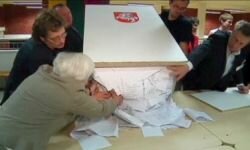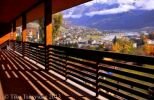Georgian Story of American Philologist Raised in Manhattan
05 September, 2013
 Mixed couples - one of the incomparable parts of the modern world
Mixed couples - one of the incomparable parts of the modern worldWe live in the age of globalization that logically leads us to mixed families. It is none of our business to judge which is better – to marry your compatriot or a foreigner. Most probably, the best way is to marry love and luck at the same time. However, there are people who might be asked what it is like to be a pair of the mixed couple. One of them is Anthony Schierman, American-born man, who currently works for the American Academy in Tbilisi as a teacher of the English Literature and Language, and Nino Stavridi, Georgian-born lady, who works for the Eurasia Foundation. Let’s meet them.
G.J: (To Anthony) what brought you to Georgia?
A.S: I was offered a job of teaching English at International House in 2003. I flew to Istanbul, met a friend, spent some time crossing Turkey and entered Georgia at Vale. The first Georgian city I saw was Akhaltsikhe.
G.J: What is it like when a man born and raised in New York City, Manhattan, decides to leave one of the largest super state – the United States of America and comes to Georgia – a completely unknown country where you weren’t sure how you would settle up?
A.S: It was very exciting. I had traveled a lot, so I was used to being in cultures that were foreign to me. As I already had a job here, it wasn’t too difficult to settle in. My first home in Tbilisi was a room in an apartment owned by Tina Bebia. She was extremely welcoming and she helped me a lot – with food, with laundry, with finding my way around. At the time I could only speak a little Russian, and that’s how we communicated. It was also a plus that my room had a balcony from which I could see almost entire Tbilisi – I loved sitting out there, drinking Nabeglavi and juice, smoking cigarettes and reading.
G.J: How did you meet your future wife?
A.S: The first time Nino and I met at the opening of Kala restaurant on Erekle II Street. Later she came to International House and became a student of one of my advanced classes (which she used to miss a lot because she was always going skiing). Later, I moved to Turkey for six months to teach at a small university there. When I returned to Tbilisi, we ran into each other on Rustaveli Avenue one evening and just hit it off. From that point on, we started spending a lot of time together.
G.J: (to Nino) have you ever imagined that you would marry an American?
N.S: No. But I wasn’t completely against the idea either.
G.J: (to both) what is it like to be a mixed couple – representatives of two different nations, cultures, genes and history? It should be difficult and at the same time, quite interesting. Did you have any difficulties in building up your relations in the beginning?
Not really. We had both lived abroad before (Anthony - in Mexico and Nino - in Greece and Cyprus), so we were already used to being around the people from the cultures different from our own. Also, Nino’s English is excellent, so we never had trouble communicating. Over the years we have visited the U.S. together quite a bit (both as a couple and, later, with the kids) and it is always a fun experience. Anthony managed to adapt to Georgian culture pretty well, and U.S. culture is already quite well known in Georgia so Nino didn’t experience any real culture shock the first time she visited New York (which is a very cosmopolitan and welcoming city to begin with). We both get along with each-other’s families, so from the very beginning things were quite comfortable.
G.J: You have two kids – Lizi and Andro. How do you see their future? They are of course, bilingual. Where will they live and work?
A.S: Our kids have the great fortune of being raised in two cultures, speaking two languages. They seem to like spending time in the U.S. and in Georgia equally – possibly because they have four wonderful grandparents who make them feel a part of wherever they are. As far as their futures are concerned, there seem to be a couple of factors: geopolitically speaking, Georgia, in many ways, seems to offer many interesting possibilities, although on the other hand, it doesn’t currently experience the stability that can be found in the U.S. But, as we see, all this can change for better or worse. At the moment, the dominant paradigm is that young Georgians want to seek their fortunes abroad. For example, at the American Academy in Tbilisi, where I teach, virtually all of the students go the U.S. or Europe to study at the universities there and a large percentage ends up living abroad. However, this trend seems to be slowly shifting as more and more youngsters decide to return to Georgia after graduation, either sensing the increased potential here or out of patriotism and a desire to keep building up the country. For us, of course, the main thing is that our kids are happy, so we will support whatever it is they decide to do. To be honest, I don’t really have strong hopes either way, as long as they remain creative, productive, and interested in life, I don’t care where they live.
G.J: Every summer you go to the United States and spend a month there. Is it possible that you will go and live in the US or do you plan to become a naturalized Georgian?
N.S: Our summer (and sometimes New Year’s) vacations in the U.S are really fantastic. We are both very lucky to be able to take time off from our jobs here and to use that time to visit Anthony’s parents. We are also quite lucky, because his parents live in Belfast, Maine in spring and summer and move to Manhattan in autumn and winter, so we experience two completely different sides of America. This summer in Maine was great for the kids: Lizi attended a day camp at the local YMCA where she made a lot of friends (and where so also started speaking English like some Valley Girl), and Andro got to ride his training wheels bicycle around Belfast harbor and other beautiful seaside locations. There are things we take advantage of when we are in the U.S. – things that are not easily found in Georgia. For example, when we are in Maine, we make a point of eating a lot of fresh seafood (especially mussels, which are Nino’s favorite). We also make great use of the local public library – we take out lots of books for the kids, while Anthony finds new material to use for his classes. The library, which has a wonderful children’s floor, is also a fun, air conditioned destination for Andro on hot days. And then, of course, there’s shopping. We hit all the huge American stores (K-Mart, Target, etc.) and do all the shopping for the kids for the following year. It’s much cheaper, there’s a larger variety and the quality is pretty good compared to similarly priced items in Georgia. We also make a point of hitting all the Goodwill super-markets in a 3-4 town radius. These second-hand stores are amazing – so much great stuff for ridiculously low prices. It also sounds ironic to the kids because they are used to the Goodwill in Tbilisi – one of the fanciest supermarkets in town.
Visits to New York City are also fantastic. We were there for a week this summer and there is so much to do. Inevitably, we spend at least a full day at the American Museum of Natural History (Lizi got really into the Native American exhibits this year, and both the kids go crazy for the underwater/ocean stuff). Of course we also take advantage of the ridiculous variety of food options New York has to offer (had some great Cuban-Chinese food this time). Although we happened to be there during a heat wave and it seemed that a lot of our time was spent searching for playgrounds with fountains/kiddie pools. By the way, let me say that this is one area in which the U.S. is well ahead of Georgia: the playgrounds – even the smallest ones – are fantastic. They are well-maintained, full of interesting climbing stuff and equipped with ground mats to protect the kids when they inevitably fall down. You can let the kids run barefoot without fear (even in NYC). Tbilisi playgrounds tend to be dangerous places equipped with either Soviet-era gear, or cheap Turkish sets and the ground is hard pack dirt with broken glass (the one exception is the new playground at the Kura embankment called Rike).
As for where we will live permanently, our current plans are to stay in Tbilisi for the foreseeable future. Both the kids go to great schools here, we both have jobs that we like and our standard of living is quite comfortable. At the moment we are quite happy with just our yearly trips to America.
G.J: What does the Georgian-American ideal lifestyle look like?
The ideal Georgian-American lifestyle is having two great families in these two great places, which, quite fortunately, we have!
G.J: (To Anthony) what brought you to Georgia?
A.S: I was offered a job of teaching English at International House in 2003. I flew to Istanbul, met a friend, spent some time crossing Turkey and entered Georgia at Vale. The first Georgian city I saw was Akhaltsikhe.
G.J: What is it like when a man born and raised in New York City, Manhattan, decides to leave one of the largest super state – the United States of America and comes to Georgia – a completely unknown country where you weren’t sure how you would settle up?
A.S: It was very exciting. I had traveled a lot, so I was used to being in cultures that were foreign to me. As I already had a job here, it wasn’t too difficult to settle in. My first home in Tbilisi was a room in an apartment owned by Tina Bebia. She was extremely welcoming and she helped me a lot – with food, with laundry, with finding my way around. At the time I could only speak a little Russian, and that’s how we communicated. It was also a plus that my room had a balcony from which I could see almost entire Tbilisi – I loved sitting out there, drinking Nabeglavi and juice, smoking cigarettes and reading.
G.J: How did you meet your future wife?
A.S: The first time Nino and I met at the opening of Kala restaurant on Erekle II Street. Later she came to International House and became a student of one of my advanced classes (which she used to miss a lot because she was always going skiing). Later, I moved to Turkey for six months to teach at a small university there. When I returned to Tbilisi, we ran into each other on Rustaveli Avenue one evening and just hit it off. From that point on, we started spending a lot of time together.
G.J: (to Nino) have you ever imagined that you would marry an American?
N.S: No. But I wasn’t completely against the idea either.
G.J: (to both) what is it like to be a mixed couple – representatives of two different nations, cultures, genes and history? It should be difficult and at the same time, quite interesting. Did you have any difficulties in building up your relations in the beginning?
Not really. We had both lived abroad before (Anthony - in Mexico and Nino - in Greece and Cyprus), so we were already used to being around the people from the cultures different from our own. Also, Nino’s English is excellent, so we never had trouble communicating. Over the years we have visited the U.S. together quite a bit (both as a couple and, later, with the kids) and it is always a fun experience. Anthony managed to adapt to Georgian culture pretty well, and U.S. culture is already quite well known in Georgia so Nino didn’t experience any real culture shock the first time she visited New York (which is a very cosmopolitan and welcoming city to begin with). We both get along with each-other’s families, so from the very beginning things were quite comfortable.
G.J: You have two kids – Lizi and Andro. How do you see their future? They are of course, bilingual. Where will they live and work?
A.S: Our kids have the great fortune of being raised in two cultures, speaking two languages. They seem to like spending time in the U.S. and in Georgia equally – possibly because they have four wonderful grandparents who make them feel a part of wherever they are. As far as their futures are concerned, there seem to be a couple of factors: geopolitically speaking, Georgia, in many ways, seems to offer many interesting possibilities, although on the other hand, it doesn’t currently experience the stability that can be found in the U.S. But, as we see, all this can change for better or worse. At the moment, the dominant paradigm is that young Georgians want to seek their fortunes abroad. For example, at the American Academy in Tbilisi, where I teach, virtually all of the students go the U.S. or Europe to study at the universities there and a large percentage ends up living abroad. However, this trend seems to be slowly shifting as more and more youngsters decide to return to Georgia after graduation, either sensing the increased potential here or out of patriotism and a desire to keep building up the country. For us, of course, the main thing is that our kids are happy, so we will support whatever it is they decide to do. To be honest, I don’t really have strong hopes either way, as long as they remain creative, productive, and interested in life, I don’t care where they live.
G.J: Every summer you go to the United States and spend a month there. Is it possible that you will go and live in the US or do you plan to become a naturalized Georgian?
N.S: Our summer (and sometimes New Year’s) vacations in the U.S are really fantastic. We are both very lucky to be able to take time off from our jobs here and to use that time to visit Anthony’s parents. We are also quite lucky, because his parents live in Belfast, Maine in spring and summer and move to Manhattan in autumn and winter, so we experience two completely different sides of America. This summer in Maine was great for the kids: Lizi attended a day camp at the local YMCA where she made a lot of friends (and where so also started speaking English like some Valley Girl), and Andro got to ride his training wheels bicycle around Belfast harbor and other beautiful seaside locations. There are things we take advantage of when we are in the U.S. – things that are not easily found in Georgia. For example, when we are in Maine, we make a point of eating a lot of fresh seafood (especially mussels, which are Nino’s favorite). We also make great use of the local public library – we take out lots of books for the kids, while Anthony finds new material to use for his classes. The library, which has a wonderful children’s floor, is also a fun, air conditioned destination for Andro on hot days. And then, of course, there’s shopping. We hit all the huge American stores (K-Mart, Target, etc.) and do all the shopping for the kids for the following year. It’s much cheaper, there’s a larger variety and the quality is pretty good compared to similarly priced items in Georgia. We also make a point of hitting all the Goodwill super-markets in a 3-4 town radius. These second-hand stores are amazing – so much great stuff for ridiculously low prices. It also sounds ironic to the kids because they are used to the Goodwill in Tbilisi – one of the fanciest supermarkets in town.
Visits to New York City are also fantastic. We were there for a week this summer and there is so much to do. Inevitably, we spend at least a full day at the American Museum of Natural History (Lizi got really into the Native American exhibits this year, and both the kids go crazy for the underwater/ocean stuff). Of course we also take advantage of the ridiculous variety of food options New York has to offer (had some great Cuban-Chinese food this time). Although we happened to be there during a heat wave and it seemed that a lot of our time was spent searching for playgrounds with fountains/kiddie pools. By the way, let me say that this is one area in which the U.S. is well ahead of Georgia: the playgrounds – even the smallest ones – are fantastic. They are well-maintained, full of interesting climbing stuff and equipped with ground mats to protect the kids when they inevitably fall down. You can let the kids run barefoot without fear (even in NYC). Tbilisi playgrounds tend to be dangerous places equipped with either Soviet-era gear, or cheap Turkish sets and the ground is hard pack dirt with broken glass (the one exception is the new playground at the Kura embankment called Rike).
As for where we will live permanently, our current plans are to stay in Tbilisi for the foreseeable future. Both the kids go to great schools here, we both have jobs that we like and our standard of living is quite comfortable. At the moment we are quite happy with just our yearly trips to America.
G.J: What does the Georgian-American ideal lifestyle look like?
The ideal Georgian-American lifestyle is having two great families in these two great places, which, quite fortunately, we have!





















































